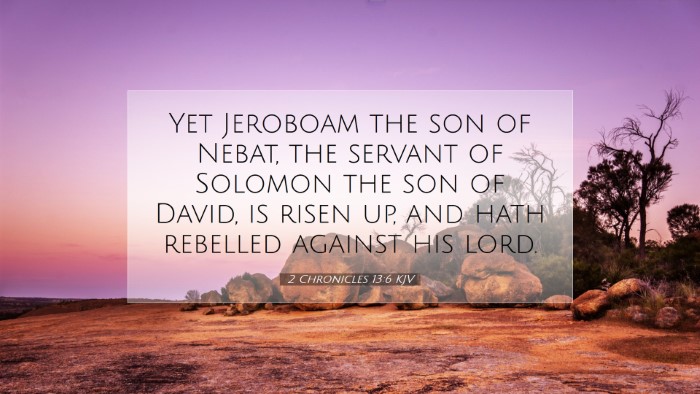Commentary on 2 Chronicles 13:6
Bible Verse: "Yet Jeroboam the son of Nebat, the servant of Solomon the son of David, is risen up, and hath rebelled against his lord."
Introduction
This verse serves as a critical historical reference in the narrative of the divided kingdom of Israel. It points to the actions of Jeroboam, a former servant of Solomon, who rebelled against the rightful king of Judah, Rehoboam. The implications of this verse are profound, not only for the understanding of political dynamics in ancient Israel but also for theological reflection on loyalty, leadership, and rebellion against divine authority.
Historical Context
Jeroboam's Background: Jeroboam, son of Nebat, was initially an official serving in Solomon's administration. His rise to prominence is attributed to prophetic endorsement by Ahijah the Shillonite, who foretold his future leadership over ten tribes of Israel (1 Kings 11:29-39).
The Rebellion: Following Solomon’s death, Jeroboam capitalized on the discontent among the northern tribes, who were unhappy with Rehoboam's harsh policies. This resulted in the fracturing of the united monarchy and the establishment of the Northern Kingdom of Israel, in direct opposition to the Davidic line of Judah.
Theological Insights
This verse illustrates not just a historical event, but also theological themes relevant to the faithful. The rebellion symbolizes a turning away from God’s appointed authority.
Lessons on Authority
- Divine Appointment: Jeroboam's rebellion reflects the consequences of defying God’s established order. His initial position as a servant should have fostered humility and loyalty, but instead, it led to ambition that went awry.
- Warning Against Rebellion: The verse acts as a cautionary tale for leaders and followers alike, demonstrating the pitfalls of rebellion and the significance of remaining steadfast in one’s appointed role.
Character of Jeroboam
Jeroboam’s character can be analyzed from various perspectives:
- Ambitious yet Divisive: He embodies the archetype of a leader whose ambition led to division within the covenant community.
- Servant to Rebel: His transition from a servant of Solomon to an adversary of Rehoboam underscores the potential for power to alter one’s loyalties and actions.
Commentary Insights
Matthew Henry’s Perspective
Henry emphasizes the spiritual implications of Jeroboam's rise. He notes that despite his initial service, Jeroboam’s rebellion exemplifies how pride and ambition can corrupt a leader’s heart. Henry calls attention to how this event serves as a reminder of the dangers posed by those who turn from rightful authority and divine guidance.
Albert Barnes’ Exegesis
Barnes explains the significance of the rebellion in the broader narrative of the monarchies of Israel and Judah. He discusses how this act of rebellion initiated a long-standing enmity between the two kingdoms, contributing to the eventual downfall of both houses. Barnes further notes that Jeroboam's actions were not simply political but also represented a theological departure from worship as prescribed in the Law.
Adam Clarke’s Analysis
Clarke highlights the prophetic aspects of the narrative, suggesting that Jeroboam’s actions were foretold and thus part of God’s sovereign plan. He stresses the idea that while human ambitions lead to division, God's ultimate sovereignty prevails. Clarke also points out the moral lessons to be gleaned from Jeroboam’s behavior and the necessity of recognizing one’s place within God’s order.
Practical Applications
- Leadership Integrity: Leaders within the Church must uphold integrity and loyalty to God’s commands, recognizing that their authority comes from divine appointment.
- Community Unity: The need for unity among believers is paramount. Jeroboam’s rebellion serves as a poignant reminder of the consequences of divisions within the Body of Christ.
- Stewardship of Power: Individuals in positions of power must be vigilant against the temptations of pride and rebellion that can lead them away from their responsibilities.
Conclusion
2 Chronicles 13:6 encapsulates a pivotal moment in Israel’s history that reverberates with moral and theological implications. The figures of Jeroboam and Rehoboam serve as archetypes in the discussion of authority, rebellion, and the consequences of unfaithfulness to God’s appointed order. Through historical reflection and theological engagement, believers are challenged to examine their own loyalties and motivations in the context of the divine calling.


